by Jarrett Hoffman
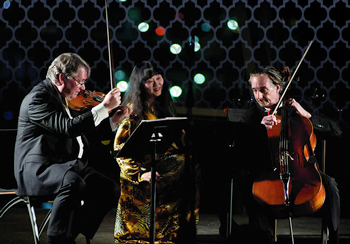
•Cleveland Chamber Music Society opens season with an audience-favorite piano trio
•The Callisto Quartet gets two new violinists
•Two collaborators each write an article about working on Mozart
•Almanac: the many sides of Clara Schumann
HAPPENING TODAY:
“When you’ve been booking visiting chamber ensembles for seven decades, you develop some special relationships that regularly bring audience favorites back to town,” Daniel Hathaway writes in a preview of the Cleveland Chamber Music Society’s first concert of the season.
That category of artists certainly includes pianist Wu Han, violinist Philip Setzer, and cellist David Finckel, who will play Schubert’s two piano trios in Kulas Hall at the Cleveland Institute of Music tonight at 7:30 pm. Roger Klein will give a pre-concert lecture at 6:30. Tickets are available here.
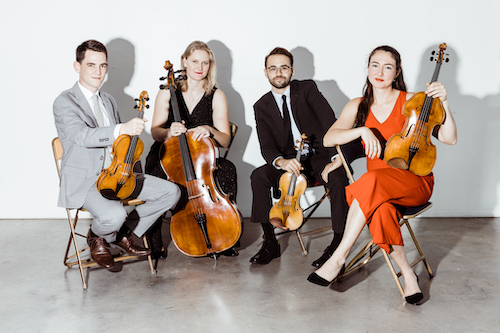
Speaking of chamber music, there’s a new pair of violinists in the CIM-born Callisto Quartet. Joining violist Eva Kennedy and cellist Hannah Moses will be Cameron Daly, who spent the past two years playing in the Naples Philharmonic, and Gregory Lewis, who is pursuing his doctorate at Yale. They replace the outgoing Paul and Rachel Aguilar.
Formed at CIM in 2016, the Callisto won the Grand Prize at the 2018 Fischoff National Chamber Music Competition, then took home Second Prize at the 2019 Banff International String Quartet Competition. More recently they completed a two-year residency at the Caramoor Center for Music and Arts. They head the chamber music program at the Suzuki Music School of Westport.
Read more about the new members here from The Violin Channel.
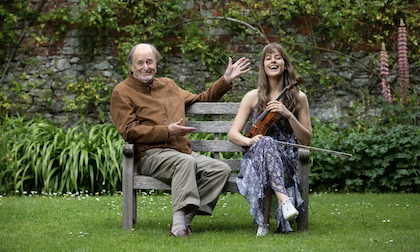
A conductor and a violinist recently collaborated on an album of Mozart’s five violin concertos. In separate articles, they each share their experiences.
“I’ve been trying to play Mozart for 60 years. On this, my last recording, I think I’ve finally cracked it.” So says, the recently retired Roger Norrington, 88, that icon of the historically-informed-performance movement, in an article for The Guardian.
Norrington’s journey in Mozart has included insights gleaned through the use of period instruments, the transfer of that information over to modern instruments, the study of the violin treatise written by the composer’s father the same year Mozart was born, and the focus on that “crucial factor” of tempo.
Norrington’s collaborator is a 33-year-old with an international career in solo and chamber music: Italian-born, London-based violinist Francesca Dega, who shares her own perspective on the album in an article for The Strad.
In addition to Norrington’s six S’s — “Sources, Size, Seating, Speed, Sound, and Style” — she highlights the conductor’s opinion that “whoever is incapable of sitting on the floor and making a child laugh with joy cannot perform Mozart,” and that “simplicity and instinct should always guide a performance.” In other words, K.I.S.S. — “keep it simple, stupid.”
Photo by James Cheadle
TODAY’S ALMANAC:

It was at the piano where Schumann achieved international stardom during her lifetime, becoming one of the foremost virtuosos of the 19th century. A child prodigy, she was touring Europe by age 11, and a series of recitals in Vienna at age 18 inspired a glowing response from listeners of all varieties.
Audiences sold out venues to hear her play. Fellow musicians sang her praises — including Franz Liszt in a letter that was later published — as did leading poets such as Franz Grillparzer. State officials gave her Austria’s highest musical honor. And as one critic wrote:
In her creative hands, the most ordinary passage, the most routine motive acquires a significant meaning, a colour, which only those with the most consummate artistry can give.
Early on, her father chose showy repertoire for her, but later she championed the music of her contemporaries, including Brahms, Mendelssohn, and her husband Robert Schumann. Indeed one of the under-recognized elements of her legacy lies in the art of programming: the shift away from virtuosic displays to serious works.
She also made important contributions to piano pedagogy. As an influential professor at Dr. Hoch’s Konservatorium in Frankfurt, where she was the only woman on the faculty, she attracted students from around the world, emphasizing in her teaching such qualities as expression, tone, and the subordination of technique to the composer’s intentions.
Such subordination to a composer’s vision was central to her philosophy about performing. That was a key sticking point later on in her professional relationship with Liszt, who welcomed the spotlight with his emotional, and physical, interpretations.
Another element of hostility between them (part of a larger conflict in that era that has become known as the “War of the Romantics”) lay in disagreements about the direction of composition: the tradition of Beethoven (a camp that generally included herself, her husband, and Brahms) vs. transcending older forms (a desire held by Liszt and Wagner).
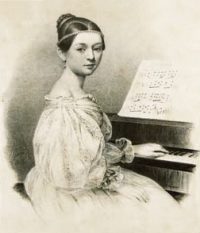
Her output was relatively small, since she mostly stopped composing at age 37 after her husband’s death. Even before that point, composition was at times crowded out by other responsibilities. As Robert Schumann wrote,
Clara has composed a series of small pieces, which show a musical and tender ingenuity such as she has never attained before. But…she cannot work at it regularly, and I am often disturbed to think how many profound ideas are lost…
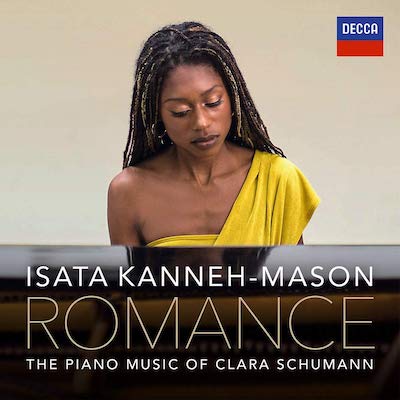
“I think the fact that we don’t hear much of her music has nothing to do with the quality of the music,” Kanneh-Mason told NPR. “It’s all to do with the history and the fact that female composers are not recognized as much by musicians.”
Listen to the full album on Spotify, and watch Kanneh-Mason perform a favorite of hers — the Scherzo No. 2 in c — on YouTube.




